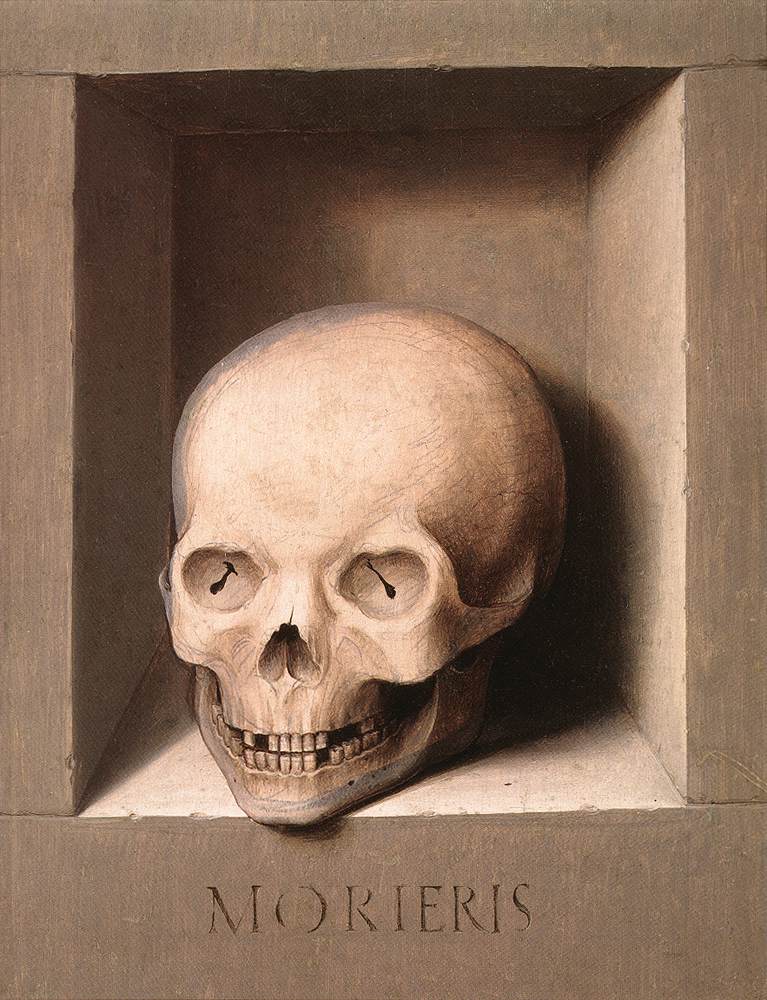.

Diptych of Maarten Nieuwenhove (detail): Hans Memling, 1487, oil on oak panel (Memlingmuseum, Sint-Janshospitaal, Bruges)
Sweet day, so cool, so calm, so bright,
The bridal of the earth and skie:
The dew shall weep thy fall to night,
.......For thou must die.
Sweet rose, whose hue angrie and brave
Bids the rash gazer wipe his eye:
Thy root is ever in its grave,
.......And thou must die.
Sweet spring, full of sweet dayes and roses,
A box where sweets compacted lie;
My musick shows ye have your closes,
.......And all must die.
Onely a sweet and vertuous soul,
Like season'd timber, never gives;
But though the whole world turn to coal,
.......Then chiefly lives.
George Herbert (1593-1633): Vertue, from The Temple (1633)

Diptych of Maarten Nieuwenhove (detail): Hans Memling, 1487, oil on oak panel (Memlingmuseum, Sint-Janshospitaal, Bruges)

St John and Veronica Diptych (reverse of the right wing): Hans Memling, c.1483, oil on wood, 31.6 x 24 cm (National Gallery of Art, Washington)

St John and Veronica Diptych (reverse of the left wing): Hans Memling, c.1483, oil on wood, 31.6 x 24 cm (National Gallery of Art, Washington)
Last Judgment Triptych (detail): Hans Memling, 1467-71, oil on wood (Muzeum Narodowe, Gdansk)
Ralph Vaughn Williams: Sweet Day (choral arrangement of George Herbert's Vertue)
ReplyDeleteThis poem has meant many things to many people.
ReplyDeleteIn Ford Madox Ford's grand quartet of novels of the First World War, Parade's End, the poem appears as a kind of talisman of England's lost pastoral innocence.
With the barrage heralding a German offensive about to begin, Ford's hero, Christopher Tietjens, has found himself transported in his imagination from the embattled Brigade position at the front... to the seventeenth century:
"The name Bemerton suddenly came into his mind. Bemerton was George Herbert's parsonage, outside Salisbury... The cradle of the race as far as our race was worth thinking about. He imagined himself standing up on a little hill, a lean contemplative parson, looking at the land sloping down to the Salisbury spire. A large, clumsily-bound seventeenth-century testament, Greek, beneath his elbow... Imagine standing up on a hill! It was the unthinkable thing there!"
And then as the fury of the German attack mounts:
"He felt the desire to pant, as if he had just drunk at a draft a too great quantity of liquid. He did not pant..."
When the sun rises to reveal the carnage in the trenches, the opening lines of the Herbert poem flood the mind of Ford's soldier-hero.
"The gravel certainly looked more pink now the sun had come up... It was rising on Bemerton! Or perhaps not so far to the west yet. The parsonage of George Herbert, author of 'Sweet day so cool, so calm, so bright, the bridal of earth and sky!'"
The memento has a rhythmic character, the lines' syllabic evocation of calm breathing and a steady beating heart helping Tietjens regain composure amid a scene of apocalyptic chaos.
Tom,
ReplyDeleteHerbert's "Sweet day, so cool, so calm, so bright" coupled with Memling's pictures, and followed by Ford's "The gravel certainly looked more pink, now that the sun had come up" -- gives us pause.
1.15
light coming into sky above still black
ridge, bird slanting toward left corner
in foreground, wave sounding in channel
memory of “things,” “person”
in position following
first picture, upper corner
before color, between
cloudless blue sky reflected in channel,
shadowed green canyon of ridge above it
Beautiful paintings. Didn't know that Bemerton figured in Parade's End. The church there is beautiful.
ReplyDeletein the begining lies the end...love this poem and specially these lines :
ReplyDeleteOnely a sweet and vertuous soul,
Like season'd timber, never gives;
But though the whole world turn to coal,
.......Then chiefly lives.
I hadn't heard the Vaughn Williams piece before; much of the harmony seems drawn from the music of Herbert's time.
ReplyDeleteThe repetition of that word "sweet" is unnerving, particularly in the third stanza.
"My musick shows ye have your closes"
Herbert's music is time passing and good and pretty things are undone till that very quiet redemption of the word in the last stanza.
I'm glad Stephen drew out that pink from Parade's End.
Who else could Tietjens turn to but Herbert when looking on that stained and rosy ground?
"Sweet" is indeed the key note in this poem whose open vowels cry out to be sung.
ReplyDeleteAnd the unvoiced, prosaic "sour" note that hangs in the air is the reality that always awaits the soldier in battle, or the mortal soul in this life.
Grim and joyful at once, this lovely gift to us from the parson of Bemerton.
A back-channel comment from Ron Padgett goes a long way toward articulating the qualities that seemed to make this poet and this painter a perfect match.
"Memling and Herbert, alone or separate, they can't be beat. Sobriety, restraint, focus, intensity, and heart..."
RP goes on to suggest that a sensitive awareness to the abiding presence of death within life also distinguishes these two masters.
Couldn't have identified the motive behind this pairing better myself.
Stunning. All of it, including the comments.
ReplyDeleteMany thanks, Bill.
ReplyDeleteRichard Burton (the actor, no less) recollected in his Diaries that this was the first poem that had ever commanded his imagination.
He meant as a youth, naturally.
Later on, of course, there were so many diverse candidates for that commander rôle.
(But as the person here who has lately been reading those Diaries adds, if he'd lived as long as we have, he'd perhaps have come back to the poem for... what would be the term?... consolation? confirmation?)